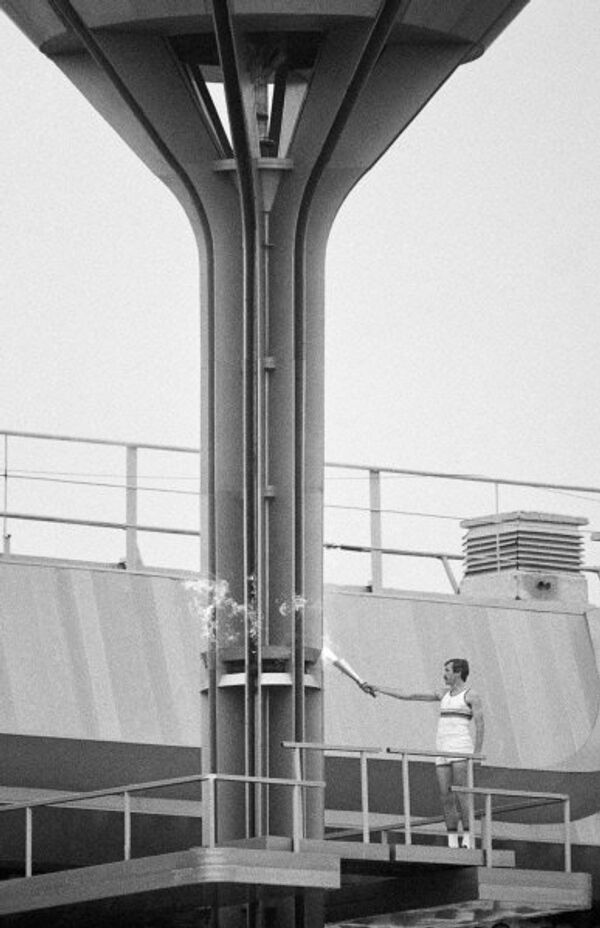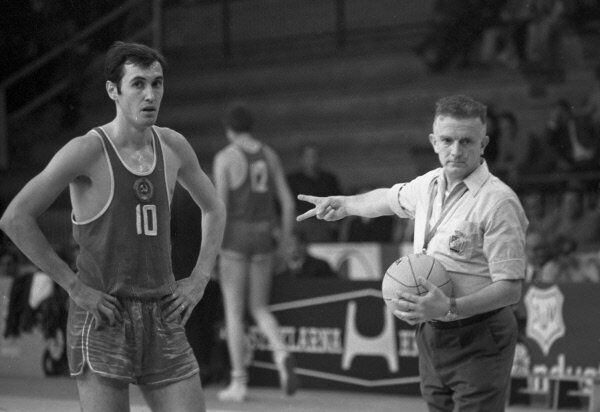WASHINGTON, October 3 (By Carl Schreck for RIA Novosti) – American basketball players and officials on Thursday mourned the death of legendary Soviet player Sergei Belov, an Olympic gold medalist known for his deadly jump shot and steely demeanor who was the first international player elected to the US Basketball Hall of Fame.
“The basketball community has lost a great friend,” National Basketball Association (NBA) commissioner David Stern said in a statement to RIA Novosti. “Sergei Belov left an indelible mark on the sport. His contributions were extraordinary.”
Belov, who passed away Thursday in the Urals city of Perm at the age of 69 after a long illness, was perhaps best known in the West as the catalyst in the Soviet national team’s controversial victory in the gold medal game against the United States at the 1972 Munich Olympics.
He was the only player to score in double figures in the game, netting 20 points as the Soviets beat the Americans 51-50 on a last-second shot in a confusing finish protested by the US team. It was the American squad’s first Olympic basketball loss ever.
“He was a hero, and we’re all going to remember him and respect the memory of a man who brought the USSR to that kind of level,” Andrei Kirilenko, a 12-year NBA veteran currently with the Brooklyn Nets and the best Russian player of his generation, told RIA Novosti in a telephone interview.

Kirilenko, who over the past decade has led the Russian national team to a European title and an Olympic bronze medal, was cut from the national team by Belov as an 18-year-old in 1999 when the Soviet legend was the team’s head coach.
“He was the guy who didn’t really listen to other people because he was sure he was doing the right thing,” said Kirilenko, a former NBA All-Star. “I think that’s why he was so successful as a high-level athlete, because he did it all his way.”
The Nets, owned by Russian billionaire businessman and politician Mikhail Prokhorov, said in a statement Thursday that Belov’s contributions to the games are “unparalleled.”
“He is considered by many to be the best international player to ever grace the game, and he will be missed,” the team said.
Sergei Kushchenko, a member of the Nets’ board of directors who hired Belov to coach the Russian club Ural Great in Perm, called Belov the “first super professional player in the Soviet Union.”
“In the most difficult situations, he always demanded the ball,” Kushchenko told RIA Novosti by telephone from Moscow.
Doug Collins, a four-time NBA All-Star who played for the United States against Belov and the Soviets in the 1972 Olympic final, said in a statement to RIA Novosti on Thursday that Belov’s death marks “a sad day for Russia and the world of basketball.”
“We lost a treasure,” said Collins, who sank two free throws to put the Americans up 50-49 with three seconds left in the game before the last-second basket that gave the Soviets the win.
Despite the acrimonious ending to that game, Collins said there was no bad blood between him and Belov. He says that after he interviewed Belov through an interpreter at the 1994 World Championships, the Soviet great said in English that he was happy to see him and wished Collins’ son Chris success with the Duke University basketball team.
“His contribution to basketball as a terrific player and as a coach was enormous,” Collins said. “I’ve always had the utmost respect for him as a player and a coach.”
A lean, 6-foot-3-inch (190-centimeter) shooting guard, Belov captured 11 Soviet league titles and two Euroleague titles with his powerhouse CSKA Moscow team from 1969 to 1980, as well as three Olympic bronze medals in addition to the 1972 gold medal with the Soviet national team.
He also won two world championships and four European titles with the national team before becoming a successful club and national team coach. In 1992 he became the first international player enshrined in the Basketball Hall of Fame in Springfield, Massachusetts.
American players who competed against Belov described him Thursday as a supremely intense competitor whose savvy, strength and pinpoint shooting allowed him to excel despite his modest physical stature and mechanical playing style.
“Sergei was strong,” said Quinn Buckner, a former NBA player and coach who played for the US national team that lost to Belov’s Soviet squad in the 1974 world championship in Puerto Rico. “He may not have looked like it, but he was strong and extremely tough-minded.”
It was virtually impossible to distract the Soviet great, who had an uncanny ability to get to a spot on the floor to set up his hallmark high-rising jump shot, Buckner said.
“When he shot it, it was pretty much in,” said Buckner, adding that he was saddened to learn of Belov’s death. “The biggest thing was to not let him get his rhythm and get on balance.”
Walter Szczerbiak, a former American Basketball Association (ABA) player who starred for the Spanish club Real Madrid in the 1970s, likened Belov’s ability to rise above a defender for his jump shot to that of Los Angeles Lakers legend Jerry West.
“It was very, very difficult to block it,” Szczerbiak told RIA Novosti by telephone from his home on Long Island, New York.
Szczerbiak also recalled Belov’s stern visage on the floor. “He sort of had this cold type of reputation on the court. Not a very friendly demeanor, just all business,” he said. “Very focused, like an iron sergeant.”
Wayne Brabender, an American-born player who also starred for Real Madrid, said he rarely saw Belov talk to his own teammates, much less to his opponents. “That’s the way he was,” he told RIA Novosti by telephone from Spain. “He played very, very tough.”
Belov was “probably the best player in Europe of his times,” Brabender added.
The game-winning shot in the 1972 Olympic final was made by another player with the last name Belov, Soviet center Alexander Belov. The two were not related.
Sergei Belov’s death Thursday came 35 years to the day after Alexander Belov passed away on Oct. 3, 1978.




